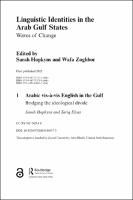Chapter 1 Arabic vis-à-vis English in the Gulf
Proposal review
Bridging the ideological divide
Abstract
This chapter explores how bottom-up and top-down language policies in the Gulf countries interact with wider language ideologies and discourses related to globalization, internationalization of higher education, and neoliberalism. Drawing on Irving and Gal’s theories of semiotic formation of language ideologies and Bourdieu’s theory of language and symbolic power, the chapter critically examines the interrelatedness of language ideologies, symbolic power and policies surrounding Arabic and English and resultant effects on linguistic identities. The chapter explores how the languages Arabic and English are often symbolically polarized despite the fact that in everyday practice, languages are interwoven through translingual practice. The chapter suggests concrete ways in which to bridge this ideological divide through glocalization and the legitimizing of translingual practice in multiple domains, including English-medium education.


 Download
Download